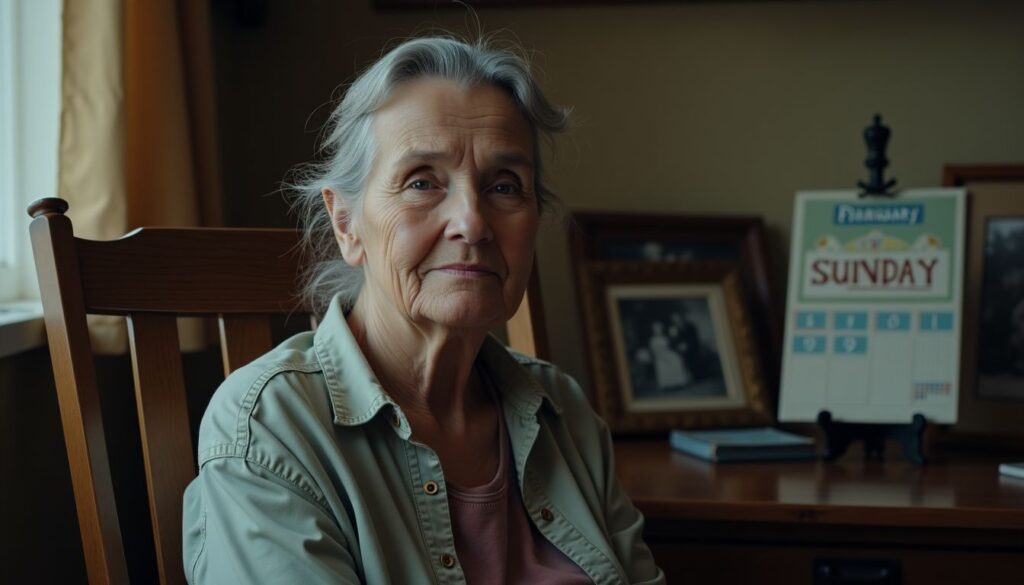What Are The 7 Stages Of Dementia?
Seeing a loved one grapple with memory issues or unusual behavior can stir deep emotions. Many families experience this journey, confronting Alzheimer’s or dementia and observing the changes in those they hold dear.
On our journey to learn more, we extensively researched this challenge. This study enabled us to grasp the stages of dementia — all seven, from no symptoms to severe difficulties in thinking and daily activities.
In this post, we outline the seven stages of dementia, explain what each stage could mean for your loved one, and provide ways to assist them at each stage. Intrigued? Let’s start together.
Key Takeaways
- There are seven stages of dementia, starting with no memory loss and ending in severe decline.
- Care needs grow as the stages of dementia progress, from reminders to full-time help.
- Life expectancy after a dementia diagnosis ranges from four to twenty years.
- Effective care includes positive talks, treatment options, and support groups.
- Acceptance of the condition helps in planning and improves care quality.
The Seven Stages of Dementia

Dementia is categorized into seven distinct stages, each representing a deeper decline in cognitive abilities. In the initial stages, individuals may experience mild memory lapses and subtle changes in behavior.
However, as the disease advances, these challenges become increasingly pronounced, leading to significant impairments in memory function and a marked alteration in behavior.
Eventually, progression through the stages of dementia severely affects daily living, making it increasingly difficult for individuals to engage with their surroundings and maintain their sense of self.
Stage 1: No cognitive impairment

In the initial phase, individuals exhibit no indications of memory loss. They carry on their everyday routines without difficulties recalling or executing tasks. We recognize this stage of dementia as standard operation, implying no issues with their cognitive abilities.
By now, individuals are capable of managing all their tasks independently. They don’t require assistance from others for self-care or domestic duties. This stage establishes the benchmark for what we consider standard regarding brain health and activity levels.
Stage 2: Very mild cognitive decline

We may discern slight alterations after observing no indications of cognitive decline. During this period, individuals sometimes misplace objects such as keys or spectacles.
They might also forget the names of recent acquaintances. This period is challenging as these minor mishaps are often attributed to regular aging.
We have observed individuals experiencing this. Approximately 40% of individuals over 65 experience these instances but aren’t yet in a position for a dementia diagnosis. Most don’t progress to severe stages shortly; only roughly 1% do annually.
Misplacing personal belongings and forgetting names become more prevalent, but daily life continues with minimal disturbance from these insignificant memory lapses.
Stage 3: Mild cognitive decline

We find our cherished ones beginning to forget items more frequently at stage 3, referred to as mild cognitive decline. It could be missed appointments or misplaced keys. They might even lose direction while driving on familiar streets.
This is challenging for us and them. Roughly 10% to 20% of individuals aged 65 and older with this level of decline might display observable signs of dementia within a year.
Job performance also declines. These changes catch our attention as they are distinct from their previous behavior. This stage indicates the need for assistance, yet everyday life continues without significant disruptions.
We extend our help by gently reminding and supporting them, aiding them in recalling tasks, and helping them regain some semblance of control in their lives.
Stage 4: Moderate cognitive decline
Moving on from Stage 3, when your loved one reaches Stage 4 of moderate cognitive decline, it might become noticeable that they face more difficulties with daily tasks and activities.
At this stage, the person may face challenges with simple math problems or have trouble managing their finances. They might also find it challenging to plan and organize things properly.
As their memory continues to decline, your loved one may need more help and support in various areas of life.
Moreover, personality changes can become even more apparent. You may notice increased social withdrawal, mood swings, emotional changes, and decreased responsiveness.
During this time, it is vital to provide a safe and understanding environment for your loved ones as they tackle these challenges.
As caregivers who truly understand where you’re coming from based on our extensive experience supporting families through similar experiences like yours, we know firsthand the intricacies of assisting individuals through the stages of dementia.
We are here to guide you every step of the way, prioritizing empathy and understanding of your loved one’s needs and your own well-being.
Stage 5: Moderately severe cognitive decline
In middle-stage dementia, also known as moderately severe cognitive decline, individuals may face challenges in carrying out daily activities and might need help. This stage typically lasts between two to four years.
Symptoms include significant memory loss, wandering, confusion, and disorientation. It’s a difficult period that requires a lot of support from caregivers and loved ones.
Moving on to the next phase – Stage 6: Severe cognitive decline…
Stage 6: Severe cognitive decline
In stage 6 of severe cognitive decline, daily activities are more challenging. Symptoms may include difficulty with ADLs and an increased need for care. Sleep problems, incontinence, aggression, anxiety, and personality changes can also occur.
It indicates that full-time care might be necessary since symptoms become complex.
We should understand that people at this stage require significant support to manage their day-to-day lives effectively. Providing a safe and comfortable environment is crucial to address the needs arising from these symptoms associated with severe cognitive decline.
Ensuring a comprehensive plan for personalized care becomes imperative at this stage to maintain the well-being of individuals experiencing severe cognitive decline.
Stage 7: Very severe cognitive decline
Moving on from stage 6, very severe cognitive decline brings about the end stage of dementia. At this point, individuals are unable to care for themselves and experience significant loss of verbal and physical capacities.
This condition typically lasts one to three years. Symptoms include difficulties with speaking, remembering loved ones, moving without assistance, chewing or swallowing food, and impaired bodily functions. This challenging phase requires understanding and support from those around the affected individual.
The Three Progressive Phases of Dementia

As dementia progresses, it occurs in three phases. Read our full blog post to learn more about these stages and for guidance on caring for a loved one with dementia.
Pre-dementia or early-stage dementia
In the early stages of dementia, our parents may appear independent and exhibit no noticeable memory loss. Their symptoms might resemble normal age-related forgetfulness. This phase encompasses stages 1, 2, and 3 of the disease.
However, brain changes during this time may indicate a potential progression toward dementia as it advances into stage 4.
As caregivers with firsthand experience in this domain, we comprehend that recognizing these early signs is vital for supporting our loved ones. It’s essential to be proactive and seek information on how to navigate through this constantly evolving environment.
Moderate or middle-stage dementia
During moderate or middle-stage dementia, significant cognitive impairment affects behavior and personality. This stage usually requires full or part-time caregiver assistance due to pronounced memory loss and confusion.
Caregivers must provide patient and empathetic support during this progression of the condition, as individuals often experience frustration and anxiety due to their declining abilities.
Understanding the unique needs of individuals in this stage is vital in providing personalized care that prioritizes comfort and dignity.
At Home Caregivers recognizes the challenges families face when caring for loved ones with moderate or middle-stage dementia.
We aim to provide clear, straightforward guidance on addressing these complexities while offering compassion and understanding throughout the caregiving journey.
Severe or late-stage dementia
In severe or late-stage dementia, there is a significant decline in cognitive abilities and physical function. Memory loss becomes pronounced, and individuals may also experience incontinence and rely heavily on others for mobility.
This stage is where full-time care is often required as symptoms worsen. It’s tough to see our loved ones struggle with their condition during this phase, but it’s essential to ensure they receive the support they need.
At Home Caregivers understands the challenges of providing care during this difficult time. We’re here to help your loved one and you navigate these profound changes.
Duration and Life Expectancy of Dementia Patients

The duration of dementia varies for each person, and it can last for many years. The life expectancy of individuals with dementia also differs, but on average, people live from 4 to 8 years after diagnosis.
Progression of dementia
Dementia changes over time and is unpredictable. Lifestyle plays a part. Diet and exercise matter. Some stay in the early stages long. In the final stage, little time is left. As with any illness, the prognosis varies with each case.
Life expectancy for dementia patients
Transitioning from the progression of dementia to life expectancy, it’s essential for us to understand that the average life expectancy post-diagnosis ranges from four to eight years.
Nevertheless, some individuals live up to 20 years after being diagnosed with dementia. When we consider specific types of dementia, statistics show that Alzheimer’s disease comes with a life expectancy of eight to ten years on average.
On the contrary, vascular dementia is associated with an average lifespan of five years. In addition, Lewy Body Dementia typically results in a life expectancy of approximately six years, while Frontotemporal Dementia is generally expected to range from six to eight years in terms of lifespan.
These figures can be overwhelming and may vary depending on individual circumstances and health management approaches.
At Home Caregivers recognizes the challenges and uncertainties families face when caring for loved ones living with these conditions through our founder’s first-hand experience dealing with similar situations (Rubens).
We’re here for you every step of the way.
How to Care for a Loved One with Dementia

When caring for a loved one with dementia, engage in positive conversations and explore treatment options. Develop a personalized care plan and seek support through caregiver groups.
Engage in positive and meaningful conversations
We should talk to our elderly parents with dementia positively and meaningfully. Effective communication can enhance our relationships with them and consider their emotional needs.
We must focus on creating a supportive environment for our loved ones, which will help us build deeper connections.
At times, it might be challenging to communicate due to their condition. However, understanding effective dementia communication strategies and being empathetic towards their emotions is crucial.
It’s about the words we use and the tone we convey while communicating. So, let’s enrich our conversations by including these strategies in our daily interactions with our loved ones living with dementia.
Explore treatment options and therapeutic approaches
When it comes to dementia treatment, it’s worth exploring various options. We should explore non-pharmacological therapies while also keeping informed about new research and treatments.
Investigate therapeutic approaches and assess their potential benefits for your loved one with dementia. It’s wise to seek more than just medication; engage in personalized activities to enhance their well-being.
By including a comprehensive care plan encompassing both pharmacological and non-pharmacological interventions, we can better address the complexities of dementia.
Staying updated on new research is vital as it supports the constantly evolving world of dementia treatment. Not only medications but occupational therapy and physical activity can play crucial roles in managing symptoms associated with different stages of dementia.
Develop a personalized care plan
We need to craft a care plan that is personalized to our loved one’s needs, taking into account their daily routines and activities. We will adjust the plan as dementia progresses to provide thorough support for them.
Join a caregiver support group
When caring for a loved one with dementia, it’s essential to join a caregiver support group. These groups provide emotional and practical assistance, connecting you with others facing similar challenges.
You can share experiences and advice while accessing resources and support networks to better care for your elderly parents at home.
Educate oneself on dementia care techniques
When caring for our loved ones with dementia, it’s crucial to educate ourselves on effective care techniques. Acquiring knowledge about dementia care can enhance our caregiving skills and improve the quality of care we provide.
By staying informed about best practices, we can develop a personalized care plan that meets the specific needs of our elderly parents.
Moreover, exploring treatment options and therapeutic approaches designed to enhance dementia care can help us navigate the intricacies of this ever-evolving field.
It’s not just about seeking information; it’s about gaining first-hand experience and integrating these learnings into our caregiving journey.
The world of dementia presents unique challenges that demand attentive and comprehensive understanding as we embrace this journey as caregivers.
By educating ourselves on dementia care techniques, we discover the keys to providing compassionate and practical support for our loved ones living with this condition.
Research local memory care options
Choosing the proper care for our loved ones is crucial. When seeking memory care options, it’s essential to explore local memory care communities and consider the level of care needed.
We should search for specialized programs and services tailored specifically for dementia patients and assess the quality of care and facilities provided.
It’s wise to look for more than just basic assistance; conversing with caregivers at these facilities can give us firsthand experience of their dedication to improving the lives of those with dementia.
Importance of Acceptance

Embracing a loved one’s dementia diagnosis can help us feel empowered and improve the time we spend together. It also supports coping with the emotional impact of the diagnosis, promoting proactive planning and care strategies.
This acceptance provides comfort and allows us to focus on making the most of our time together, ensuring that our loved ones receive the best care tailored to their unique needs.
Conclusion

In wrapping up, we’ve explored the seven stages of dementia and learned about its progressive phases and duration. We have discussed the importance of embracing this condition and how to care for loved ones with empathy.
The strategies shared are practical and efficient, offering significant impact and potential improvements for those managing the complexities of dementia care.
Further resources can be explored to enhance knowledge on this continually changing topic. Encouraging everyone to take action and remember they are together in this journey.







